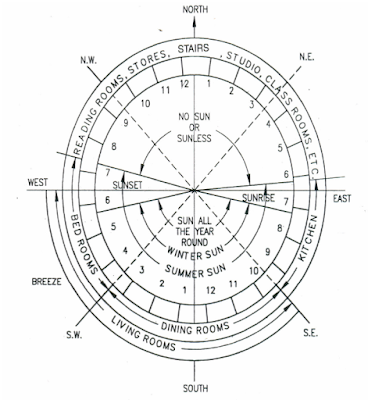Posts
Principles of BUILDING Planning
- Get link
- X
- Other Apps

Principles of BUILDING Planning The basic objective of planning of buildings is to arrange all the units of a building on all floors and at a level according to their functional requirements making the best use of the space available for a building. The shape of such a plan is governed by several factors such as climatic conditions, site location, accommodation requirements, local bylaws, surrounding environment, etc. In spite of the certain principles or factors, which govern the theory of planning, are common to all buildings of all classes intended to be used for residential purposes. These principles, enunciated below, are not rigid but just factors to be considered in planning: 1. Aspect, 2. Prospect, 3. Privacy, 4. Grouping, 5. Roominess; 6. Furniture Requirement, 7. Sanitation, 8. Flexibility, 9. Circulation, 10. Elegance, 11. Economy, and 12. Practical Considerations. 1. Aspect: - 'Aspect' means a pecu...
DESIGN OF CONCRETE STRUCTURES - I MCQ's
- Get link
- X
- Other Apps

DESIGN OF CONCRETE STRUCTURES - I MCQ Unit 1: Introduction 1) The maximum compressive strain in concrete in axial compression is taken as A. 0.001 B. 0.002 C. 0.003 D. 0.040 ANSWER: B 2) The flexural strength of concrete is given by A. 0.6√fck B. 0.7√fck C. 0.5√fck D. 0.8√fck ANSWER: B 3) Tolerance on placing the reinforcement for effective depths 200 mm or less is A. +/-5mm B. +/-6mm C. +/-8mm D. +/-10mm ANSWER: D 4) Tolerance on placing the reinforcement for effective depths more than 200 mm is A. +/-5mm B. +/-6mm C. +/-8mm D. +/-10mm ANSWER: A 5) The minimum frequency of sampling of concrete of each grade for 1-5m3 shall be A. 1 B. 2 C. 3 D. 4 ANSWER: A 6) The minimum frequency of sampling of concrete of each grade for ...